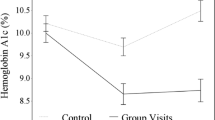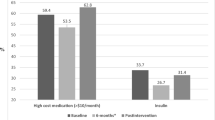Abstract
Diabetes mellitus is a prevalent chronic health condition associated with significant morbidity and mortality. Those with diabetes must acquire self-efficacy in the tasks necessary for them to successfully manage their disease. In this study, a controlled pre- and post-design was used to determine the effect of an adult support and education group visit program embedded in an urban academic family medicine practice on weight and the achievement of treatment goals for hemoglobin A1C, low-density lipoprotein (LDL) blood concentration, and blood pressure (BP) several months after it was implemented. Participants in the program were matched to a comparison group based on age, gender, race/ethnicity, and zip code group, a surrogate marker for socioeconomic status. The distribution of demographic characteristics and co-morbidities was similar between the groups. Significant increases occurred in the proportion of participants achieving both an A1C concentration <7% (CMH=4.6613, p = 0.0309) while controlling for baseline AIC concentration, and a BP<140/90 mm Hg (CMH=5.61, p = 0.018) controlling for baseline BP compared to the comparison group. The hemoglobin A1C concentration declined in 76.9% of the participants in the group visit program compared to 54.3% in the comparison group (CMH=8.9911, p = 0.0027). The increase in the proportion of group visit participants achieving the target LDL concentrations did not achieve statistical significance. The proportion of participants who lost weight was similar to that in the comparison group. Early experience with the program was encouraging and suggested it may improve patients’ management of their diabetes mellitus in an urban, predominantly African American population.


Similar content being viewed by others
References
Centers for Disease Control and Prevention. National Diabetes Fact Sheet: National Estimates and General Information on Diabetes and Prediabetes in the United States, 2011. Atlanta, GA: U.S. Department of Health and Human Services, Centers for Disease Control and Prevention; 2011.
Wagner EH, Austin BT, Davis C, Hindmarsh M, Schaefer J, Bonomi A. Improving chronic illness care: translating evidence into action. Health Affairs. 2001;20(6):64–78.
Fisher EB, Brownson CA, O’Toole ML, Shetty G, Anwuri VV, Glasgow RE. Ecological approaches to self-management: the case of diabetes. Am J Public Health. 2005;95(9):1523–1535.
Renders CM, Valk GD, Griffin SJ, Wagner E, van Eijk JT, Assendelft WJJ. Interventions to improve the management of diabetes mellitus in primary care, outpatient and community settings. Cochrane Database Syst Rev. 2001;(1):CD001481.
Deaken TA, McShane CE, Cade JE, Williams RD. Group based training for self-management strategies in people with type 2 diabetes mellitus. Cochrane Database Syst Rev. 2005;(2):CD003417.
Jaber R, Braksmajer A, Trilling JS. Group visits: a qualitative review of current research. J Am Board Fam Med. 2006;19:276–290.
Davis AM, Sawyer DR, Vinci LM. The potential of group visits in diabetes care. Clin Diabetes. 2008;26(2):58–62.
Clancy DE, Dismuke CE, Magruder KM, Simpson KN, Bradford D. Do diabetes group visits lead to lower medical charges. Am J Manage Care. 2008;14:39–44.
American Diabetes Association. Standards of medical care in diabetes—2010. Diabetes Care. 2010;33(Suppl 1):S11–S61.
Riley SM, Marshall ES. Group visits in diabetes care: a systematic review. Diabetes Educ. 2010;36:936–944.
Fitzner K, Dietz DA, Moy E. How innovative treatment models and data use are improving diabetes care among older African American adults. Pop Health Manage. 2011;14:143–155.
Brown SA, Blozis SA, Kouzekanani K, Garcia AA, Winchell M, Hanis CL. Dosage effects of diabetes self-management education for Mexican Americans. Diabetes Care. 2005;28:527–532.
Acknowledgments
We thank the members of the Jefferson Family Medical Associates Southeastern Pennsylvania (SEPA) Chronic Care Collaborative Committee (Janis Bonat, Nancy Brisbon, Victor Diaz, Kathleen Hilbert) for their advice and assistance; members of the team for their leadership and participation; the medical residents for leading group sessions; and the patients who engage in the program and contribute suggestions for the program’s improvement.
Author information
Authors and Affiliations
Corresponding author
Rights and permissions
About this article
Cite this article
Reitz, J.A., Sarfaty, M., Diamond, J.J. et al. The Effects of a Group Visit Program on Outcomes of Diabetes Care in an Urban Family Practice. J Urban Health 89, 709–716 (2012). https://doi.org/10.1007/s11524-012-9675-9
Published:
Issue Date:
DOI: https://doi.org/10.1007/s11524-012-9675-9




